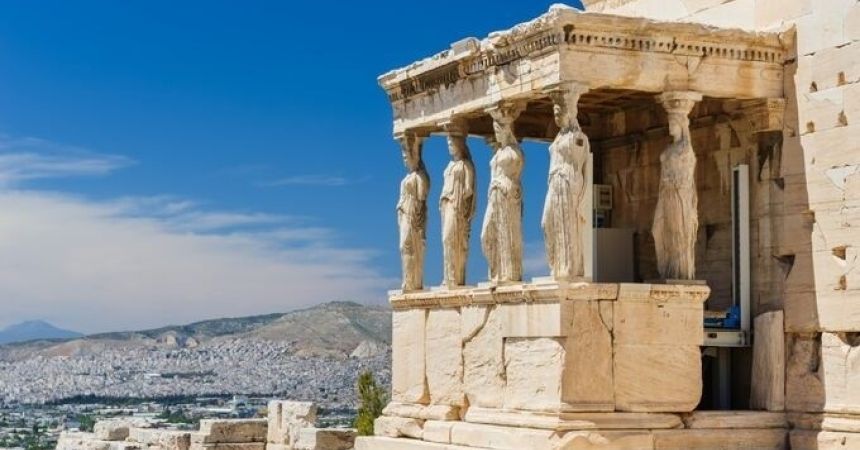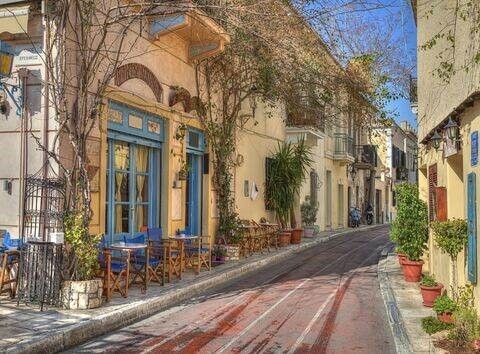
Greece Travel | History, Islands & Culture
Introduction
Greece, often referred to as the cradle of Western civilization, is a land steeped in history, rich in culture, and blessed with stunning landscapes. From the ancient ruins of Athens to the idyllic islands of the Aegean Sea, Greece offers a unique blend of historical significance and natural beauty. This comprehensive blog will delve into the many facets of Greece, exploring its history, culture, cuisine, geography, and travel tips, providing an extensive guide for anyone looking to discover this enchanting destination.
Chapter 1: Historical Overview of Greece
1.1 Ancient Civilizations
Greece's history dates back thousands of years and is marked by the rise and fall of powerful civilizations. The Minoans, based on the island of Crete, are considered one of the earliest advanced civilizations in Europe, known for their impressive palaces and intricate frescoes. The Mycenaeans followed, contributing to the development of early Greek culture and architecture.
1.1.1 The Classical Period
The Classical period (5th to 4th centuries BC) is often regarded as the zenith of ancient Greek civilization. This era produced some of the most significant achievements in art, philosophy, and democracy. The city-state of Athens emerged as a cultural and intellectual center, giving rise to notable philosophers like Socrates, Plato, and Aristotle. The Parthenon, dedicated to the goddess Athena, stands as a symbol of ancient Greece’s architectural prowess.
1.2 Hellenistic Era
Following the conquests of Alexander the Great, the Hellenistic era saw the spread of Greek culture across the Mediterranean and into Asia. This period was characterized by advancements in science, mathematics, and arts, exemplified by figures such as Euclid and Archimedes. The blending of cultures during this time laid the groundwork for future civilizations.
1.3 Roman and Byzantine Influence
Greece fell under Roman control in the 2nd century BC, becoming an integral part of the Roman Empire. Following the fall of Rome, Greece transitioned into the Byzantine Empire, which preserved and transformed Greek culture and Christianity. The Byzantine era is marked by stunning churches, such as the Hagia Sophia in Constantinople (Istanbul), showcasing the fusion of Greek and Christian influences.
1.4 Ottoman Rule and Independence
After centuries of Byzantine rule, Greece was conquered by the Ottoman Empire in the 15th century. The struggle for independence began in the early 19th century, culminating in the Greek War of Independence (1821-1829). Greece officially gained independence in 1830, establishing a new nation that celebrated its rich cultural heritage.
Chapter 2: Cultural Heritage in Greece
2.1 Language and Literature
The Greek language, one of the oldest in the world, has significantly influenced many modern languages. Ancient Greek literature, particularly the works of Homer (the "Iliad" and the "Odyssey") and the tragic playwrights like Sophocles, Euripides, and Aeschylus, laid the foundations for Western literature and drama.
2.2 Religion
Greece is predominantly Greek Orthodox, and religion plays a vital role in daily life and cultural practices. Numerous monasteries and churches, many dating back centuries, dot the landscape. Tour to Monasteries of Meteora and the Mount Athos region are significant religious sites, attracting pilgrims and tourists alike.
2.3 Festivals and Traditions
Greece is known for its vibrant festivals, which celebrate religious and cultural traditions. The Apokries (Carnival) is a lively celebration leading up to Lent, while the Panagia festival honors the Virgin Mary. The Athens and Epidaurus Festival showcases the country’s rich theatrical heritage, featuring performances of ancient Greek plays in stunning venues.
Chapter 3: Greece Culinary Delights
3.1 Traditional Greek Cuisine
Greek cuisine is a delightful amalgamation of flavors, influenced by geography, history, and tradition. Olive oil, fresh vegetables, herbs, and seafood are staples in the Mediterranean diet. Dishes like moussaka, souvlaki, and spanakopita highlight the rich culinary heritage.
3.2 Regional Specialties
Each region of Greece boasts unique culinary traditions. The islands are famous for their seafood, while mainland regions offer hearty stews and grilled meats. For instance:
- Crete: Known for its distinctive Cretan diet, featuring local herbs, cheeses, and olive oil.
- Thessaloniki: Famous for its rich culinary scene, blending flavors from various cultures.
- Santorini: Renowned for its unique tomatoes and wines, particularly the white wine known as Assyrtiko.
3.3 Street Food Culture
Street food is integral to the Greek culinary experience. Gyros, souvlaki, and koulouri (sesame bread) are popular options for a quick and delicious meal. Exploring local markets and food stalls is a must for anyone wanting to savor authentic Greek flavors.
Chapter 4: Natural Wonders
4.1 Diverse Landscapes
Greece is renowned for its diverse landscapes, from rugged mountains to crystal-clear waters. The country boasts numerous natural wonders, including:
- Mount Olympus: The mythical home of the gods, offering hiking opportunities and stunning vistas.
- The Peloponnese: Known for its rich history, beautiful beaches, and olive groves.
- The Aegean Islands: A stunning archipelago with unique landscapes and idyllic beaches.
4.2 National Parks and Wildlife
Greece is home to several national parks that protect its unique flora and fauna. The Pindus National Park and Vikos-Aoös National Park offer breathtaking landscapes and hiking trails. Wildlife enthusiasts can spot various species, including migratory birds, wild goats, and unique plant species.

Chapter 5: Iconic Destinations
5.1 Athens
Athens, the capital city, is a vibrant metropolis that beautifully blends ancient history with modernity. Key attractions include:
- The Acropolis: A UNESCO World Heritage Site featuring the Parthenon, Erechtheion, and the Temple of Athena Nike.
- The Acropolis Museum: Showcasing artifacts from the Acropolis, providing insights into ancient Greek culture.
- Plaka: The charming old neighborhood with narrow streets, shops, and traditional tavernas.
5.2 Santorini
Santorini, known for its stunning sunsets and white-washed buildings, is one of the most picturesque islands in Greece. Key highlights include:
- Oia: Famous for its breathtaking sunsets and stunning views of the caldera.
- Fira: The island’s capital, bustling with shops, restaurants, and nightlife.
- Akrotiri: An ancient Minoan settlement preserved by volcanic ash, providing a glimpse into ancient life.
5.3 Delphi
Delphi, once considered the center of the world by the ancient Greeks, Visit Oracle of Delphi and the ruins of the Temple of Apollo. The site offers breathtaking views and rich history, making it a must-visit for history enthusiasts.
5.4 Meteora
Meteora is famous for its monasteries perched on towering rock formations, offering stunning vistas and spiritual significance. The monasteries, some dating back to the 14th century, provide a serene atmosphere for reflection and exploration.
5.5 Crete
Crete, the largest Greek island, offers a blend of history, culture, and natural beauty. Key attractions include:
- Knossos: The ancient Minoan palace, known for its intricate frescoes and archaeological significance.
- Samaria Gorge: A popular hiking destination with stunning landscapes and diverse flora and fauna.
- Chania: A charming city with a Venetian harbor, showcasing Crete's rich history.
5.6 Thessaloniki
Thessaloniki, Greece's second-largest city, is a vibrant hub of culture and history. Notable sites include:
- The White Tower: A symbol of the city, offering panoramic views of Thessaloniki.
- Rotunda: An ancient Roman monument with impressive mosaics.
- Aristotelous Square: A bustling square lined with cafes and shops, perfect for people-watching.
Chapter 6: Travel Tips for Greece Trip
6.1 Best Time to Visit Greece
The best time to visit Greece is during the spring (April to June) and fall (September to October) when the weather is pleasant and tourist crowds are smaller. The summer months (July and August) can be hot and crowded, especially on the islands.
6.2 Getting Around
Greece has a well-developed transportation network, including domestic flights, ferries, buses, and trains. Ferries are the most popular way to travel between the islands, while buses and trains are excellent options for mainland travel.
6.3 Cultural Etiquette
Understanding Greek customs and etiquette is essential for a respectful visit. Greetings often include a handshake, and it’s customary to say “Kalimera” (Good morning) or “Kalispera” (Good evening). Tipping is appreciated but not mandatory; rounding up the bill or leaving small change is common practice.
6.4 Health and Safety
Greece is generally a safe destination for travelers, but it's wise to take standard precautions. Ensure you have travel insurance, stay updated on local news, and respect cultural norms. Drinking tap water is safe in most areas, but bottled water is recommended in remote locations.
6.5 Language
While Greek is the official language, many people in tourist areas speak English. Learning a few basic phrases in Greek can enhance your travel experience and endear you to locals.
Chapter 7: Experiences Not to Miss
7.1 Exploring Ancient Ruins
Visiting Greece’s ancient ruins is a journey through time. The Acropolis in Athens, the ruins of Delphi, and the ancient city of Corinth offer fascinating insights into Greece’s rich history.
7.2 Island-Hopping
Island-hopping is one of the best ways to experience Greece’s diverse landscapes and cultures. The Cyclades, Dodecanese, and Ionian Islands each offer unique charms, from sandy beaches to vibrant nightlife.
7.3 Sampling Local Cuisine
Indulging in Greek cuisine is a culinary adventure. Enjoy traditional dishes like moussaka, dolmades (stuffed grape leaves), and fresh seafood at local tavernas. Don’t forget to try local wines and desserts like baklava and loukoum.
7.4 Attending Cultural Events
Participating in local festivals and cultural events provides insight into Greek traditions. The Athens and Epidaurus Festival showcases theater, music, and dance, while local celebrations often include traditional music, dancing, and food.
7.5 Hiking in Nature
Greece’s diverse landscapes offer excellent hiking opportunities. The Samaria Gorge in Crete, the Vikos Gorge in Epirus, and trails on Mount Olympus provide stunning views and a chance to connect with nature.
Best Greece Trip Ideas for Travelers
Greece is a land of timeless beauty, rich history, and vibrant culture. From the ancient ruins of Athens to the breathtaking islands of the Aegean Sea, Greece offers a wealth of experiences for travelers seeking to explore its many facets. The warmth and hospitality of the Greek people, coupled with the country's stunning landscapes and delicious cuisine, create an unforgettable journey that lingers in the hearts of those who visit. Whether you're a history enthusiast, a nature lover, or a culinary adventurer, Greece promises an enriching experience that celebrates the essence of this remarkable nation. As you plan your journey, let the allure of Greece inspire you to embark on an adventure of a lifetime.



